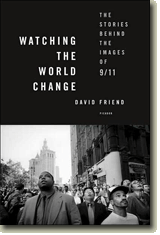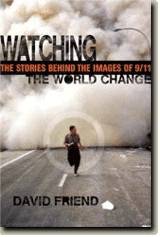« Previous · Home · Next »
September 25, 2007
THE BONDS OF A BLOG
Ron Hogan, in his GalleyCat column on Mediabistro.com, writes about this Web site in a posting, “How 9/11 Changed Our Relationship to the News.” Quoth Hogan: "The bond between author, readers, and history is not just confined to the book, however; the website Friend created continues to serve almost as a ‘shadow’ narrative, where people continue to submit their pictures of the events.” The Shadow Knows.
Which reminds me: Please send pictures and recollections that you would like to share -- of September 11, the aftermath, and related issues -- to: dfriend@vf.com.
Mediabistro also links to a YouTube video of a talk I gave this month about Watching the World Change for employees at Google’s sprawling new headquarters on Manhattan’s West Side. Ogle it HERE.
I’m also grateful to Mary Anne Ross, who wrote a piece in the Monroe Township (New Jersey) Sentinel, saying that during a recent talk Friend “held his audience at the township library spellbound.” Who’s to quibble?

SENTINEL PHOTO BY JEFF GRANIT
(YOURS TRULY IN FRONT OF A 9/12/2001 LANDSAT PHOTO)
FROM THE E-MAIL BAG:
...From Renee Birenbaum, Tufts University, Class of 2009…
"This notion is something I've been incubating over the years since the tragedy. In your presentation [earlier this month at Tufts,] you had a picture from the Bergen Record - well, to me, that newspaper covers home, sweet, home. As someone who was very close to the situation, I have sort of gotten the impression, following the attacks, that the media and technology of 2001 were able to bring the events of the day home to anyone from New Mexico to Beijing. Everyone was watching the same images and footage, getting a sense of what must be going on in the households of the tri-state area, and there is no doubt that we deeply appreciated the unified support of the rest of the country.
"But the converse of this process is that people who have direct ties to the tragedy want to tell others of their personal experiences, as if to brag about having a personal stake in a worldwide 'moment.' Akin to 'Where were you when JFK was shot?' stories, people seem to want to outdo each other with showing how personally affected they were by 9/11, by making it clear that what outsiders saw on TV is only half the story.
"I remember that on that day, we were called into the gym for an assembly - by then, I had dealt with the horror that followed listening to a classmate's father on AM 1010 [WINS Radio] describing what was happening, which lasted for four hours until I finally reached my own father, a downtown commuter, on his cell phone. A knot of kids were talking near me, and I heard one girl say 'My aunt worked in the twin towers, but went on a smoke break...so smoking saved her life.' Another kid added impressively that his father who worked in the WTC had overslept for the first time in his life that morning.
"And you know, I could have told them about my dad walking out of the subway station there a few minutes before the first plane hit, hearing the collision, looking up and seeing the fireball, and beginning the sprint to Broadway. But I felt so disgusted by the whole activity, this sort of narcissism over having firsthand experience in this momentous day - especially because I knew that there were kids in that gym who hadn't yet gotten in contact with their parents and other loved ones, kids who never did. It seemed so perverse to want to share these stories of miraculous survival when others' stories would be of suffering and loss.
"In an age where technology makes us realize just how many people there are in this world, and how few ever become newsworthy, I can see why people would jump at the chance to say they were part of something that will forever be imprinted on this generation's consciousness - but how do we define the precarious balance between telling these stories for therapeutic reasons, and perhaps dishonoring or belittling the lives of those people who weren't lucky enough to oversleep or go out for a cigarette?
"I didn't feel comfortable raising my hand with this during your presentation because I felt that saying 'on the day my mom found out she was pregnant with Andrew, my family was terrified until my father walked in the door, covered in soot' would seem like gloating. And at the same time, shouldn't these things remain private, these moments when the Rest of the World somehow managed to penetrate my suburban bubble and directly affect my family? But then again, years from now I'll be able to show my children exactly how I felt on 9/11, because they will be able to see the same images and footage that I did six years ago.
"I know this email has been long-winded, and if you've gotten this far I salute you. But basically my question comes down to this: what do you think of the effect that the media has had on the public's way of dealing with such tragedies, especially with respect to the need that people feel to make their own personal 9/11 story known?"
A Response. Thanks for this, Renee. Very thoughtful. And much appreciated.
I believe that it is a natural human impulse to turn personal experience of an event into an eyewitness account and sometimes this seems to the outside observer to border on gossip or one-up-man-ship. Since people have little experience in how to modulate their accounts of being a witness to tragedy, I think many can be forgiven their need to aggrandize their role or their own personal tale.
For the first time since World War II, war came to our shores on September 11, 2001. And so our personal narratives were bound up in the grander narrative because, in our own way, each of us felt a part of history. Each of us understood, subconsciously, that his or her very narrow experience represented something more universal. Our individual tales did matter. And so we felt compelled to share those experiences.
That said, you're right: the media has made us all mini-story tellers and has trained us well. When I was growing up “way back in the day,” people were not as savvy about being photographed for the press, about how their family or community or company would be portrayed in the newspapers or on television. But nowadays, everyone seems to know how to talk the media talk, how to market himself or herself (think about the industry in college resume consulting!) Now, every kid with a few software programs is his or her own programmer, creating videos, composing songs, making their own stories heard. Which isn't necessarily a bad thing.
Apropos of this exchange with Renee, photographer Alan Chin has posted a probing photo essay on Michael Shaw's popular photo-related blog, BagNewsNotes. By focusing on bystanders' reactions to the sixth anniversary of the attacks, Chin's images, shot this past September 11 within a two-block radius of Ground Zero, address how we are still trying to grapple with our responses to 9/11 and, further, make us ponder the relevance of memorializing in this breakneck age.

PHOTO BY ALAN CHIN


